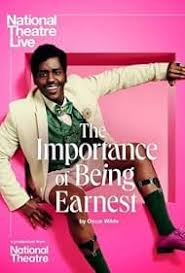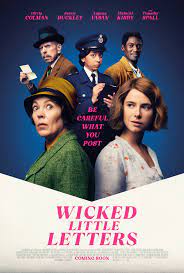Displaying items by tag: Hugh Skinner
Importance of Being Earnest, The, National Theatre

THE IMPORTANCE OF BEING EARNEST
UK, 2025, 179 minutes, Colour.
Ncuti Gatwa, Hugh Skinner, Sharon D.Clarke, Eliza Scanlon, Ronke Adekoluejo, Amanda Lawrence, Richard Cant, Julian Bleach.
Directed by Max Webster.
Once again, Oscar Wilde’s celebrated last play, from 1895.
In 1952, there was the straightforward basic staging as a drawing room comedy film, top English cast led by Michael Redgrave and Dame Edith Evans (and her still remembered classic outraged “handbag”!). It is frequently repeated for screenings on SBS World Movies and so readily available for audiences today.
There have been quite a number of filmed stage versions, even featuring David Suchet as Lady Bracknell.
There was also the 2001 version, very strong cast led by Colin Firth and Judi Dench as Lady Bracknell, but with something of an eye to modern tastes, even imagining Gwendolyn with a tattoo and the idea that Lady Bracknell began her career in the music hall. There were also some notable (inexplicably) omissions from the text.
Now here is the film version of the National Theatre’s 2025 production, complete text to delight those who have appreciated it for a long time. But the word definitely not to be used here is “straightforward”. This is not exactly a straightversion. Commentators on the play have referred to the “queer codes” inserted by Wilde, implicit references.
An unexpected opening sets the tone, Ncuti Gatwa (television’s Dr Who) in a pink gown, playing the piano, a Grieg Symphony, joined by the cast dancing around the piano. Then, stopping suddenly, the curtain opening – and we are back in 1895.
The opening is familiar, Jack visiting Algy, the conversation, Jack’s love for Gwendolyn, the imminent arrival of Lady Bracknell… And the mystery of Jack being Jack in the country and Earnest in the city and Algernon and his creation of his sick friend, Bunbury, whom he has to visit to comfort at a moment’s notice. Themes of deception, relationships. But, while Hugh Skinner as Jack gives an effective performance, he is quite overshadowed so often by Ncuti Gatwa, Jack almost playing straight man (the technical comedy term) to Algernon’s flamboyant domination of the friendship and the play.
It is apt to describe the production as camp in style, manner and mannerisms, but a great deal of posing, lots of postures, running and shuffling around the stage and a great deal of innuendo.
Every audience waits to see what Lady Bracknell is going to be like, a dominating presence, her articulation of opinions, her capacity for being shocked and astounded. Sharon D. Clarke certainly dominates this production – with “handbag” voiced in low, deep dismay. She controls the main two scenes in which she is present, both snobbish and exploitative when tempted by money and class.
Australian Eliza Scanlan is a forthright Sicily. Ronke Adekoluejo is an unexpectedly knowing Gwendolyn, hyperactive (sometimes irritatingly so) and extrovert in the innuendo in a very cheeky tone. Audiences will enjoy the performers playing Miss Prism, Canon Chasuble and the actor playing the two servants.
It is probably correct to say that Oscar Wilde would have enjoyed this particular interpretation of his play, making explicit the issues in his own life and relationships, but we also remember that this was his last play, the court case, his public humiliation, imprisonment and lonely death.
Wicked Little Letters

WICKED LITTLE LETTERS
UK, 2023, 100 minutes, Colour.
Dear Coleman, Jessie Buckley, Timothy Spall, Gemma Jones, Anjana Vasan, Eileen Atkins, Joanna Scanlan Lolly Adefope, Hugh Skinner.
Directed by Thea Sharrock.
They certainly are!
England, 1920, still feeling the aftermath of the war and the war dead, a small English village, Hampton. This is all based on an actual story, rediscovered in 2017, comic writer (half of the In-Between as, Jonny Sweet) saw it as an opportunity to write a wry British comedy. So, the basic facts might be based on reality, the way the characters act, their interactions, serious and comic, may not be held this episode actually was.
Wicked letters have unpleasant contents. In this case, they are highly offensive, scabrous, touches of the obscene, course and crass language, swearing. Those who might be feeling fastidious, it might be best to give this one a miss. But, for those prepared to take the language in its context, this is, in fact, an entertaining comedy was a lot of critique of British life. And the makers have decided to introduce a number of black characters, policewoman, judge, whether they would not have been present in 1920. It would be interesting to imagine how Ealing Studios might have made this film within the context of the 1950s.
Wicked little letters can be seen as anticipating the trolling of 21st-century social media.
The cast is excellent. Olivia Coleman has proven herself in a wide range of roles, from the Queen in The Crown to her Oscar-four as Queen one in The Favourite. And Irish actress-singer, Jessie Buckley, has also shown her talent in a variety of different roles. Here they are pitted against each other, Olivia Coleman as the very prim, religious, repressed and righteous, Edith, seen at home with her emotionally monstrous father, quite a different role for Timothy Spall, and her ever-patient, easily-offended mother, Gemma Jones. And she is the recipient of the letters, her mother upset, her father angry, going to report to the local police.
And, the main suspect lives next door, an unmarried Irish mother with the daughter, Rose, Jessie Buckley. Most audiences would realise very quickly that Rose did not write the letters – and not necessarily a surprise when we discover, half way through, who is writing the letters.
But, the police, a lot of satire in their presentation, instantly ready to arrest Rose. The chief is blustering and self-important. It is one assistant, played by Hugh Skinner, is rather dim but fancies himself. And they have Gladys, having to call herself “woman police officer Gladys Moss”, looked down on, dismissed as a suffragette, who eventually enlists the help of an interesting group of ladies in the town, fine cameos from veterans Eileen Atkins, Joanna Scanlon, Lolly Adefope, to defend Rose who has been carted off to jail (paying her bail), and elaborating schemes to unmask the letter writer.
The two leads bring their respective characters to vivid life, Rose with the touch of the raucous but kindly, victimised, Edith the epitome of biblical quotes, repression, subservient to her demanding father, not entirely unhappy with all the publicity in the media as the letters victim.
The film is often very funny – and the final outburst of obscenities, definitely in context and a damning judgement, will probably make most audiences burst out laughing!
- Based on a true story? The right treatment? Serious? Comic? A British treatment, satire on British society?
- The title, stories of poison pen letters? Anticipation of social media patrolling? The effect on those involved, the targets, investigations, unmasking?
- The atmosphere of the town, small, after World War I, memories of the war, the war dead, the Irish moving to England? Small town atmosphere, people knowing each other? The streets, the homes, adjacent? Shared facilities, the bath? Gossip?
- The situation, it is, her age, the past love and her dismissing him (and the real story of her father emerging later), at home with her mother and father, her religiosity, Bible reading? Completely subservient to her father? Her friendship with Rose, next door, talk, walk along the beach?
- Rose, Irish background, with her daughter, the story of her dead husband in the war, the relationship with Bill? Raucous, the lovemaking and the crucifixion banging on the wall? At the pub, drinking, shouting? Her language? Her love for her daughter?
- The letters, the content, the language, obscene, personal attacks? Edith and the letters, her mother and father, the reaction, her father going to the police?
- The police, the satiric presentation, the chief, rushing to conclusions, his busy life, disregarding the writing, wanting results? Castable paperwork, personality, a bit dim, the investigations, sexist towards Gladys? Collaboration with the Chief? The further investigations, the interrogations, the arrest?
- Conclusion that Rose was writing the letters, her comment that she needn’t have written but could have given the insult to verbally? Her arrest? Her daughter, Bill, everybody observing? Going to jail, the experience of jail, seeing Edith at the station giving her testimony? The police treatment? Her life in jail, acceptance?
- Edith, reading the Bible, giving the interviews, the media, her liking the celebrity?
- Edith and her parents, her dominating father, completely unsympathetic, ruling her life? Her mother, the effect of the letters, the death? The funeral? The priest, the prisoners, the memories?
- Edith and her playing twist? Her friends? Going to the club? The games, the talk? The friends and their own ideas, able, strong-minded, the discussions with And and Kate? Suspicions? Deciding to post bail? Welcoming Roses?
- Rose, the return home, awaiting trial? The support of the friends? The revelation about Nancy’s father, Bill being upset? Rose being branded a liar?
- The letters starting again, the various targets, the insults? Even the police? The police and their reaction, still targeting Rose, the issue of the writing?
- Gladys, her father is policeman, her training, 1920, the screenplay making a point about this impossible situation of the time? Her having to identify herself as woman police officer? The interviews with Rose, the documents, her suspicions, but of holding the letter of the law? Her treatment by the chief? By the constable? Are life at home? Her decision to intervene, looked down on by Edith’s father? The writing, particularly lettering? Her teaming up with Mabel and the others? Trying to catch Edith? Stalking her, the stamps and the envelope, the unmasking?
- Rose, the trial, her being outspoken, the prosecutor, the defence, the witnesses? Are being branded a liar?
- The reconciliation with can build, love for her daughter?
- Half way through, the audience, probably already suspecting, seeing Edith writing the letters, delighting in the language, the animosity? Her being trapped, her reaction?
- The reaction of her father, her being taken away, the fell-Marist blast given at the end – and the audience laughing?
- Serious? Funny? The use of language – and in this context?